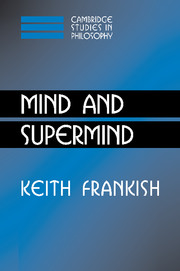Book contents
6 - Propositional modularity
Published online by Cambridge University Press: 22 September 2009
Summary
We have seen how supermind theory can vindicate some problematic elements of folk psychology – among them, the claims that belief can be flat-out, language-involving, and actively formed. I shall now move on to consider some other contentious aspects of the folk outlook and show how these, too, can be vindicated by the theory. The present chapter looks at a thesis known as propositional modularity – a cluster of claims about the way beliefs and other propositional attitudes are stored and processed. The next chapter will then consider a related thesis about conceptual capacities – conceptual modularity, as I shall call it. In each case I shall argue that folk psychology is committed to the thesis in question, building on arguments in the literature, and then go on to show that this commitment can be vindicated at the supermental level. (The case for a folk commitment to propositional modularity and for its supermental vindication has already been partially prefigured in the earlier discussion of rich functionalism, but the present chapter will extend and reinforce it.) Showing that the modularity theses are true of the supermind will also serve to block a certain line of argument for eliminativism – the view that folk-psychological concepts and principles will eventually be eliminated from science – and I shall begin with some remarks on this.
THE ELIMINATIVIST THREAT
This section discusses the nature and scope of the eliminativist threat to folk psychology and describes the line of response I shall advocate.
Information
- Type
- Chapter
- Information
- Mind and Supermind , pp. 161 - 183Publisher: Cambridge University PressPrint publication year: 2004
